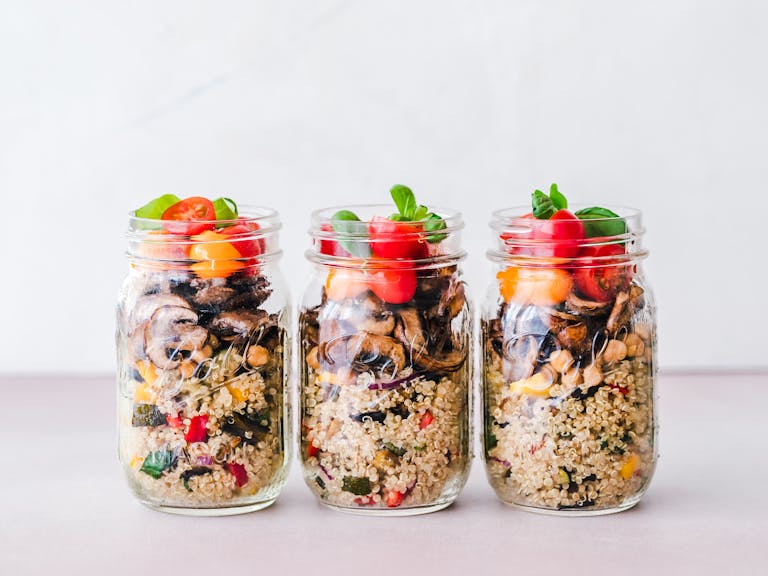Okay bestie, can we talk about the supplement aisle for a hot minute? Because walking into Target’s wellness section feels like entering a parallel universe where every bottle promises to change your life, boost your energy, clear your skin, AND help you sleep better. It’s giving “too good to be true” energy, and honestly, most of the time it is.
I’ve been down this rabbit hole – we’re talking spreadsheets tracking different brands, Amazon carts full of bottles I never opened, and that one time I bought a “superfood blend” that tasted like lawn clippings and cost more than my grocery budget. Not my finest moment.
Here’s what I’ve learned after years of research, too much trial and error, and way too many conversations with functional medicine practitioners: building your foundational supplement stack doesn’t have to be complicated or expensive. The best biohacking supplements are actually pretty boring – no flashy marketing, no miracle promises, just solid science supporting what your body actually needs.
Let’s figure this supplement thing out together, minus the overwhelm and with actual evidence backing our choices.
Before We Dive In: What Actually Makes a Supplement ‘Foundational’?
Before we start building your biohacker supplement guide, let’s get real about what “foundational” actually means. I’m not talking about the supplements with the prettiest Instagram ads or the most celebrity endorsements (looking at you, overpriced greens powders).
The “Fill the Gaps” Approach
Even if you’re eating your vegetables and prioritizing whole foods, modern life makes it pretty tough to get everything your body needs from food alone. Our soil isn’t as nutrient-dense as it used to be, we’re dealing with chronic stress that depletes certain nutrients faster, and let’s be honest – none of us are eating perfectly 100% of the time.
Foundational supplement stack thinking means focusing on the nutrients that are hardest to get from food or that most women are commonly deficient in. We’re not trying to replace a balanced diet; we’re strategically filling the gaps.
The 80/20 Rule for Supplements
Here’s the thing about supplements: 20% of them will provide 80% of the benefits you’re looking for. The trick is identifying that crucial 20% and not getting distracted by every new trend that pops up on your feed.
I’m all about that evidence-based approach over shiny object syndrome. Give me boring supplements with solid research over flashy marketing any day.
Bioavailability Basics
Not all supplements are created equal, and this is where quality actually matters. You can buy the cheapest magnesium on Amazon, but if your body can’t absorb it, you’re literally flushing money down the toilet. Form matters, timing matters, and taking certain nutrients together (or apart) can make a huge difference in whether they actually work.
The Holy Trinity: Your Best Biohacking Supplements Foundation
Let’s start with the big three – the supplements that should be in basically everyone’s daily supplement routine because the research is solid and the benefits are clear.
Omega-3s: Your Brain’s Best Friend
If I could only choose one supplement to take forever, omega-3s would probably be it. The omega-3 benefits go way beyond just heart health (though that’s important too).
Why women especially need this: Our hormones fluctuate throughout our cycle, and omega-3s help support that entire process. They’re anti-inflammatory powerhouses, which means better skin, more stable moods, and less of that hormonal brain fog we all know too well. Plus, most of us aren’t eating fatty fish multiple times per week, so we’re likely not getting enough from food alone.
What to look for: This is where quality really matters. Look for a supplement with a 2:1 or 3:1 ratio of EPA to DHA, third-party tested for purity (because mercury is not the vibe), and in triglyceride form rather than ethyl ester for better absorption. I know, I know – it sounds complicated, but good brands will clearly list this information.
Dosing and timing: Aim for 1-2 grams of combined EPA and DHA daily (like this one), and take it with a meal that contains some fat for better absorption. Your avocado toast moment just got an upgrade.
Magnesium: The Mineral You’re Probably Missing
Magnesium for sleep has become the wellness internet’s obsession, and for good reason – up to 75% of people aren’t getting enough of this crucial mineral. But magnesium does way more than just help you sleep better.
The sleep connection everyone’s talking about: Magnesium glycinate specifically helps activate your parasympathetic nervous system (your “rest and digest” mode) and supports natural melatonin production. It’s like giving your body permission to actually wind down instead of lying in bed with your mind racing about tomorrow’s to-do list.
Beyond sleep: This mineral is involved in over 300 enzymatic reactions in your body. It supports energy production, helps regulate your stress response, and is crucial for bone health. Basically, it’s doing a lot of heavy lifting behind the scenes.
Form matters big time: Magnesium glycinate is the gold standard for sleep and general absorption. Magnesium oxide is cheaper but has poor bioavailability (and might upset your stomach). Magnesium L-threonate is newer and targets cognitive benefits specifically. Choose based on your primary goal.
Vitamin D3 + K2: The Dynamic Duo
Unless you’re living somewhere sunny year-round and spending significant time outdoors without sunscreen (which, please don’t skip the sunscreen), you’re probably not getting enough vitamin D. And here’s the plot twist – vitamin D works best when paired with vitamin K2.
Why we’re all deficient: Our indoor lifestyles, necessary sunscreen use, and geographic limitations (hello, winter) mean most of us aren’t producing enough vitamin D naturally. Even if you’re eating fortified foods, it’s tough to get optimal levels from diet alone.
The K2 connection: Vitamin D helps your body absorb calcium, but vitamin K2 makes sure that calcium goes to your bones instead of hanging out in your arteries where it doesn’t belong. They’re like a team – one without the other isn’t nearly as effective. Look for MK-7 form of K2 like this one for better stability and absorption.
Level Up: Supplements for Energy and Focus That Actually Work
Once you’ve got your foundation solid, these are the supplements for energy and focus that are worth considering if you want to optimize your performance.
Creatine: Not Just for Gym Bros
Let’s clear this up right now: creatine for women is not just okay, it might actually be more beneficial for us than for men. Research shows that females have 70-80% lower natural creatine stores compared to males, which means we have more room for improvement.
Breaking the myths: Creatine will not make you bulky. It will not make you retain water in a way that’s visible or uncomfortable. What it will do is help your muscles (including your brain – yes, your brain uses creatine too) produce energy more efficiently.
The brain benefits no one talks about: Creatine helps buffer energy production in your brain cells, which can reduce mental fatigue and improve cognitive performance. If you’ve ever hit that afternoon wall where thinking feels impossible, creatine might help with that.
Dosing for women: 3-5 grams of a high-quality creatine daily is plenty – no loading phase needed despite what the bro-science internet might tell you. Some women find it particularly helpful during their luteal phase when energy typically dips.
B-Complex: Your Energy Insurance Policy
B vitamins work as a team to support energy production at the cellular level. Taking individual B vitamins can create imbalances, so a good B-complex is usually the way to go.
Look for methylated forms (they’ll say “methylcobalamin” instead of “cyanocobalamin” for B12, for example) because some people have genetic variations that make the standard forms harder to use. Take it in the morning with breakfast because B vitamins can be energizing.
Adaptogenic Support (Optional Add-On)
If you’re dealing with chronic stress or want to optimize your stress response, adaptogens like ashwagandha or rhodiola can be helpful additions. Some supplements are made with both! But these are definitely “nice to have” rather than foundational – get your basics dialed in first.
Putting It All Together: Your Starter Supplement Stack Game Plan
Now let’s talk about actually implementing your daily supplement routine without it becoming a part-time job.
The Minimalist Approach (Budget-Friendly)
Start here if you’re new to supplements or working with a tighter budget:
- High-quality omega-3 (EPA/DHA combo)
- Magnesium glycinate
- Vitamin D3 + K2 combo
This foundation will cost you around $40-50 per month and covers the most common nutrient gaps. You can find quality versions of all of these without breaking the bank.
The Optimizer Approach
Once you’ve been consistent with the basics for a few months and want to level up:
- Add creatine monohydrate
- Include a methylated B-complex
This bumps your monthly investment to around $75-100 but gives you a more comprehensive approach to optimization.
Timing Your Stack
Morning (with breakfast): Vitamin D3+K2, B-complex, creatine With lunch or dinner: Omega-3s (better absorption with fat) Evening (1-2 hours before bed): Magnesium
This timing maximizes absorption and prevents the energizing supplements from interfering with your sleep.
Quality Markers to Look For
- Third-party testing certificates (usually available on the company website)
- Transparent labeling with specific amounts, not “proprietary blends”
- GMP (Good Manufacturing Practice) certification
- Brands that invest in research, not just marketing
What I Wish Someone Had Told Me: Supplement Red Flags to Avoid
Let’s talk about the red flags that took me way too long to recognize.
Marketing Red Flags
“Proprietary blends” are basically supplement companies saying “we’re not going to tell you how much of each ingredient is in here.” Hard pass. You deserve to know what you’re putting in your body and in what amounts.
Unrealistic promises like “lose 20 pounds in 2 weeks” or “cure your anxiety naturally” are not just red flags, they’re basically alarm bells. Supplements support health; they don’t perform miracles.
MLM supplements deserve their own category of skepticism. When someone’s income depends on selling you supplements, the advice might not be as objective as you’d hope.
Quality Red Flags
No third-party testing means you’re taking the company’s word that what’s on the label is actually in the bottle. Independent testing isn’t negotiable for me anymore.
Mega-doses of everything isn’t better – it’s often wasteful and sometimes harmful. More isn’t always more when it comes to nutrients.
Random Amazon supplements with no brand history or customer service can be tempting when they’re cheap, but quality control is often questionable.
Budget Reality Check
You don’t need to spend $200 per month on supplements to be healthy. Consistency with a few high-quality basics will serve you better than a medicine cabinet full of expensive bottles you take sporadically.
Generic can be fine for some supplements (like basic magnesium glycinate), but for others (like omega-3s), investing in quality makes a real difference in effectiveness.
Once You’ve Mastered the Basics: What’s Next?
After you’ve been consistent with your foundation for a few months, you might want to get more personalized with your approach.
Testing Before Supplementing
Consider getting basic blood work done to see where you actually stand with nutrients like vitamin D, B12, and iron before adding more supplements. Some functional medicine practitioners also offer more comprehensive nutrient testing.
Genetic testing can provide insights into how you process certain nutrients, but it’s definitely not necessary for most people starting out.
Cycling and Breaks
Most foundational supplements can be taken continuously, but some (like certain adaptogens) work better when cycled. Pay attention to how you feel and don’t be afraid to take breaks to reassess.
Seasonal adjustments can also be helpful – you might need more vitamin D in winter or different support during particularly stressful periods.
Your Supplement Journey Starts Here
Building your foundational supplement stack doesn’t have to be overwhelming or expensive. Start with the big three – omega-3s, magnesium, and vitamin D3+K2 – and focus on consistency over perfection.
Pay attention to how you feel. Are you sleeping better? Do you have more stable energy throughout the day? Is your mood more balanced? These are the real markers of whether your supplements are working for you.
Remember, supplements are exactly that – supplemental to a foundation of good sleep, balanced nutrition, regular movement, and stress management. They’re not magic bullets, but they can be powerful tools when used strategically.
Which foundation supplement are you going to start with? Your future, more energized self is waiting on the other side of that consistency.
The best time to start was probably months ago, but the second-best time is right now. Start simple, stay consistent, and build from there.
DISCLAIMER: Some links on this site are affiliate links, which means we might earn a small commission if you shop through them (no extra cost to you—think of it as buying us a matcha 🍵 for the research).
While some of us are doctors, we’re not your doctors. The info on this site is meant to educate and empower, not diagnose or treat. Always chat with your own healthcare provider before starting new meds, peptides, supplements, or that intense cold plunge-fasting-stack we’re raving about. You do you—but do it safely. 💪






